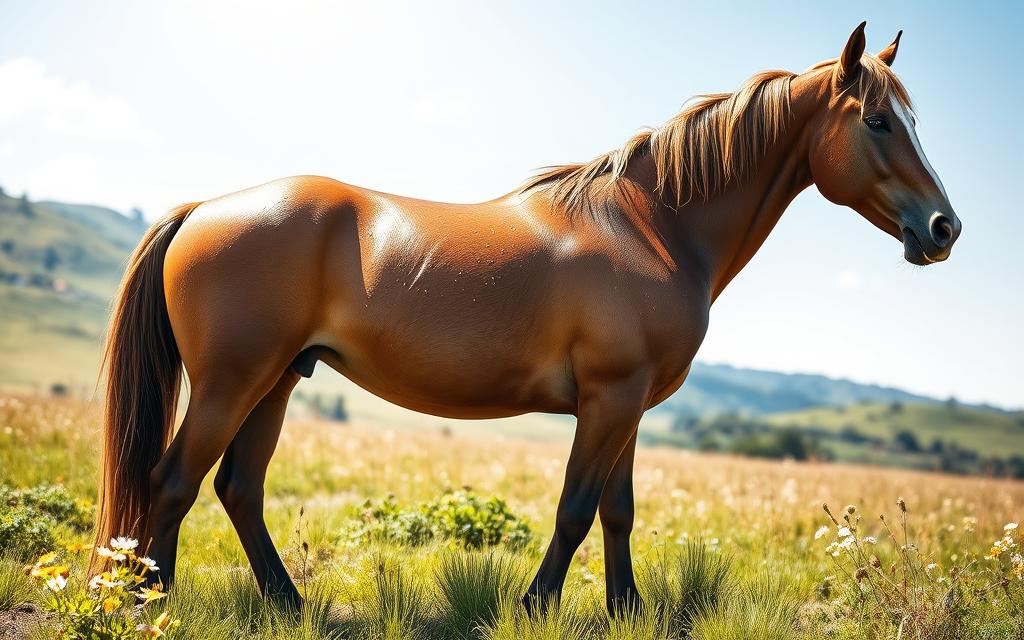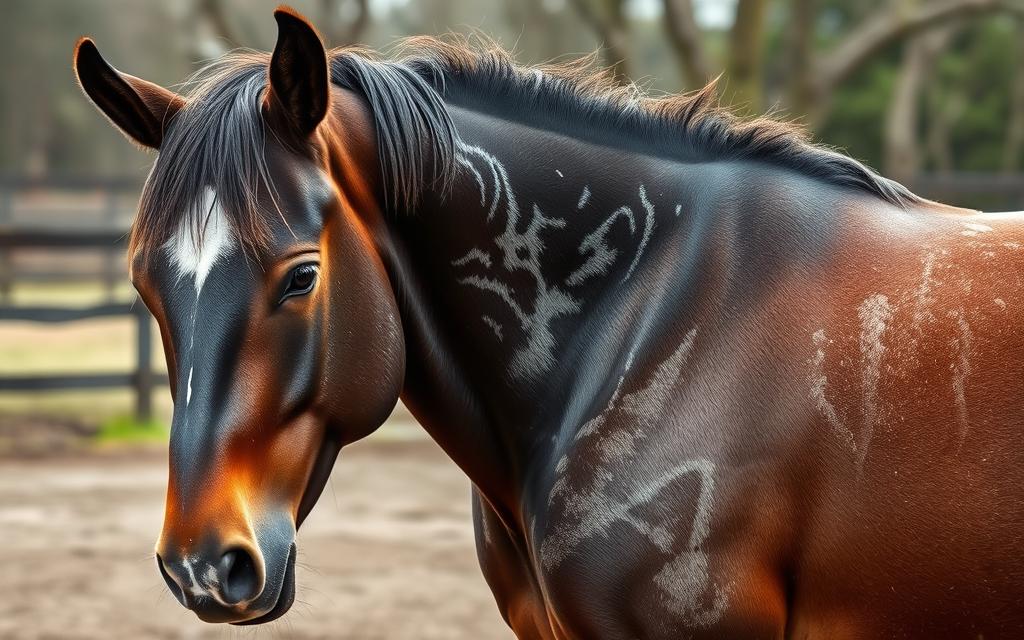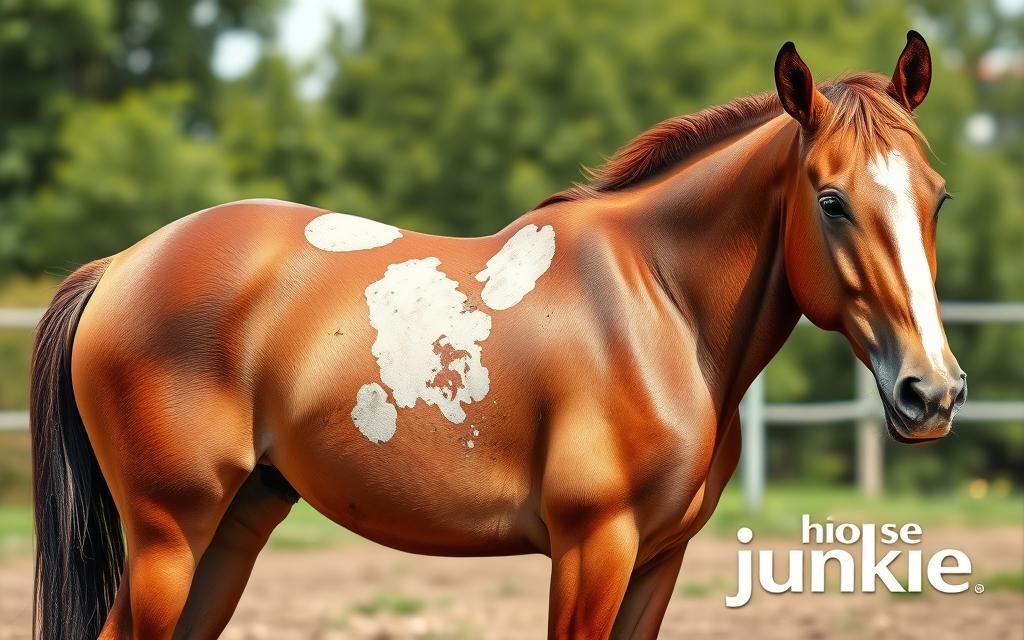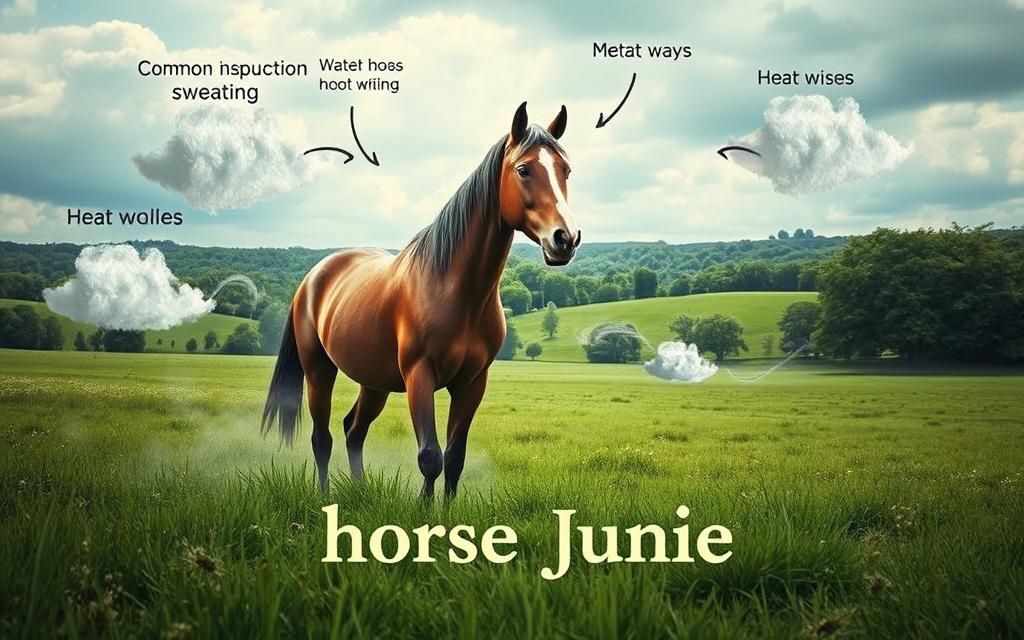Can Horses Sweat? Equine Cooling Facts Revealed

Ever wondered if horses sweat like we do? The answer might surprise you. Horses don’t sweat like humans do. They have a special way of cooling down that’s all their own.
Knowing how horses sweat is key to keeping them healthy. This is especially true when they’re working hard. It helps us take better care of them.
Horses have special sweat glands all over their skin. These glands help them stay cool, even when they’re working hard. But sweating is just one way they keep their body temperature right.
They also change how blood flows and breathe to stay cool. In this article, we’ll dive into the science of horse sweating. We’ll see why it’s important and how to care for our horses in different situations.
Key Takeaways
- Horses can sweat a lot, losing up to 10 liters of water during hard exercise.
- Using wool or cotton can help horses cool down better than synthetic fleece.
- Keeping a horse’s temperature right is key, with an average of 37.7°C.
- Signs of dehydration include fast breathing, which could mean heat illness.
- Proper grooming and clipping help horses cool down more efficiently.
Understanding Horse Physiology and Sweating
Knowing how horses keep cool is key for their care. Horses have special ways to control their body heat. When they exercise, they make a lot of heat inside. To stay cool, they use blood flow and sweat.
How Do Horses Regulate Body Temperature?
The first step in horse thermoregulation is widening skin capillaries. This lets heat out into the air. As it gets hotter or they move more, they sweat to cool down. Sometimes, their blood can’t move heat fast enough, so they sweat.
The Role of Sweat Glands in Equines
Horses have special horse sweat glands for cooling. Their sweat helps cool down through evaporation, especially in warm weather. But, they lose water and important salts when they sweat. This shows why they need to drink enough and have the right salts, especially if they’re working hard.
The Science of Sweating in Horses
Learning about horse sweating helps us understand their health and how well they perform. Horses have special ways to sweat that helps them stay cool when they’re active. We need to look at what horse sweat is made of, how much they can sweat, and what affects their sweat.
What is the Composition of Horse Sweat?
Horse sweat is mostly water, but it also has important salts. These salts help keep the horse hydrated and its muscles working right. The main salts are:
- Sodium
- Chloride
- Potassium
These salts are key for the horse to perform well, especially when it’s really active. The most lost ion is chloride, followed by sodium and potassium.
How Much Can a Horse Sweat?
A grown horse can sweat a lot, especially when it’s hot or working hard. They can lose many gallons of sweat. In some cases, they can lose up to 7.4% of their body weight in water. This shows how important staying hydrated is for their health.
Factors Affecting Sweat Production
Many things can change how much a horse sweats. These include:
- Fitness Level: Fitter horses sweat more efficiently.
- Hydration Status: Being well-hydrated is key for sweating right.
- Environmental Conditions: Heat, humidity, and temperature affect sweat rates.
Knowing these factors helps us see why horses sweat differently. It helps us keep them healthy and performing well in various conditions.
When Do Horses Sweat?
Understanding when horses sweat is key to their health and performance. Sweating helps them regulate their body temperature, especially during exercise and in different weather. This knowledge helps us keep our horses comfortable and safe.
Sweating During Exercise
Horses naturally sweat when they exercise. This helps them cool down. They can lose about four gallons of sweat per hour, especially in hard work.
This cooling is crucial to avoid overheating. Watching how much they sweat helps us manage their water and salt needs.
Environmental Conditions Affecting Sweat Rates
Weather affects how much horses sweat. High humidity and hot temperatures make them sweat more. This can lead to overheating.
On hot days, horses might need to drink a lot of water. They could need between 11 to 24 gallons to stay hydrated. Knowing this helps us keep them comfortable and healthy.

Differences Between Horses and Other Animals
Understanding how horses sweat differently from other animals is key to knowing their unique body functions. Unlike dogs and cats, horses have a special way of cooling down. This helps them keep their body temperature right when they’re active.
Why Horses Sweat More Efficiently Than Dogs or Cats
Horses have a top-notch cooling system. Their sweat has proteins that help it evaporate faster. This lets them cool down better than dogs or cats.
Many people wonder if horses sweat like humans. The answer is yes, but in a special way. They can lose up to 65 to 70% of their body heat through sweat. This is important for their performance in different conditions.
Evolutionary Benefits of Sweating in Equines
The benefits of sweating in horses are huge. It helps them handle physical stress and stay strong during long activities. Their sweat helps keep their body temperature stable.
This special sweating ability lets horses do tasks that need a lot of stamina. It makes them different from other animals.

Recognizing Abnormal Sweating Patterns
Understanding how horses sweat can tell us a lot about their health. It’s important to notice when their sweating is off, especially when they’re working hard or in different weather. We need to watch for signs that a horse might be struggling.
Signs of Dehydration in Sweating Horses
Dehydration shows up in different ways in horses. Here are some signs to look out for:
- Thick, sticky sweat that’s not watery like normal.
- Gums that look pale or bluish.
- Eye sockets that seem sunken or the horse looks tired.
- The horse acts differently, like not wanting to move or eat.
These signs mean the horse might be very dehydrated. We need to act fast to help them.
Conditions That Affect Sweating
Some health issues can change how a horse sweats. For example, anhidrosis stops horses from sweating, which can be dangerous. Another issue is sweating too much when it’s not hot, which might mean the horse is in pain.
Horses might also change how they stand if they’re uncomfortable. We should also watch for:
- Facial expressions that show pain levels.
- Changes in how much they eat, which could mean they’re sick.
- Heart and breathing rates that are too high, showing distress.

By keeping an eye out for these signs, we can help our horses more during hard work or bad weather. Spotting problems early helps us take care of them quickly.
The Importance of Electrolytes for Sweating Horses
It’s key to understand how vital electrolytes are for our horses, especially when they sweat a lot. When horses sweat, they lose important electrolytes. This can upset their hydration balance and affect their performance. It’s important to replace these minerals quickly to keep them healthy.
Role of Electrolytes in Hydration
Electrolytes like sodium, potassium, and magnesium are crucial for horses. They help keep fluids balanced and muscles working right. When horses sweat, they lose these minerals, which can lead to dehydration and poor performance. Giving them fresh water and salt, along with electrolyte supplements, helps them recover and stay hydrated after exercise.
Recommended Electrolyte Supplements for Horses
Choosing the right electrolyte supplements for horses is important. Look for products with the right mix of minerals. Here are some good options:
- McCauley’s Hydrolyte – a sugar-free supplement with sodium, chloride, calcium, and magnesium.
- Electrolyte powders mixed into water to encourage drinking during and after exercise.
- Liquid electrolyte solutions designed to enhance rapid absorption and replenishment.
Using these supplements helps fight the bad effects of too much sweating. It keeps our horses hydrated and ready for more challenges. Following good hydration strategies and managing electrolytes improves their performance, especially in tough weather.
Best Practices for Caring for Sweating Horses
Caring for sweating horses requires attention to their hydration and cooling. Horses sweat to keep their body temperature in check. We must ensure they stay hydrated, especially when they’re active or in the heat. Good care boosts their performance and health.
Hydration Strategies for Active Horses
To keep our horses hydrated, we should consider the following points:
- Provide fresh, clean water at all times, especially during hot weather.
- Monitor daily water intake, ensuring mature horses drink between 5 to 10 gallons at 68°F and up to 19 to 24 gallons when exercising in higher temperatures.
- Incorporate electrolyte supplements as needed, particularly in conditions where horses sweat heavily. This helps replace lost electrolytes like sodium and potassium.
- Encourage water consumption after exercise by offering electrolyte-rich fluids, which promote hydration absorption and overall recovery.
Cooling Techniques After Exercise
Effective cooling techniques are key for horses after they’ve exercised. Here are some practical methods to consider:
- Spraying the horse with cool water helps facilitate heat loss. As the water evaporates, it effectively lowers their body temperature.
- Scraping off excess water after spraying allows for efficient cooling, preventing overheating while maintaining adequate moisture levels on the skin.
- Seeking shaded areas and providing ample rest contributes to the cooling process and aids in recovery from strenuous activities.

Training and Conditioning for Better Sweating
It’s key to understand the role of training and conditioning in horses. They adapt to heat better and sweat more effectively with training. A smart conditioning plan helps them handle heat stress, boosting their performance.
Gradual Acclimatization to Heat
Getting horses used to heat slowly is crucial. Training them helps their blood flow and sweat glands work better. This makes them less likely to overheat during hard work. Important steps include:
- Slowly increasing the duration of exercise in warmer temperatures.
- Monitoring hydration levels and allowing adequate rest between workouts.
- Providing electrolytes to support recovery and maintain balance in sweat composition.
How Conditioning Affects Sweat Response
Conditioning greatly impacts a horse’s sweat response during exercise. Conditioned horses can keep up their performance without getting too hot. The advantages of conditioning are:
- Enhanced muscle strength and coordination, leading to more effective energy use.
- Lower resting heart rates, allowing for increased exercise levels with reduced strain.
- Improved respiratory function, resulting in better oxygen uptake and overall endurance.
Mixing different types of exercise, from aerobic to anaerobic, is key. This approach helps horses build heat resistance. It leads to better health and performance in warm weather.
Myths and Misconceptions About Horse Sweating
Many myths about horse sweating are common in the equestrian world. These myths can confuse us about our horses’ health and care. Knowing the truth about sweating helps us support our horses better.
Common Myths About Equine Sweat
One myth is that all horses sweat the same. But, sweating varies a lot among horses. It depends on their fitness, breed, and training.
Some horses sweat a lot when they exercise, while others sweat less. Another myth is that too much sweat always means a horse is sick. But, how much a horse sweats also depends on the weather and how hard they work.
Facts vs. Fiction: Horse Sweating
Horses can drink a lot of water when they sweat. An average horse drinks 5 to 10 gallons a day at normal temperatures. But, they drink more when it’s hot or they’re exercising a lot.
Sweat also makes horses lose important salts and minerals. So, they need the right supplements to stay hydrated and perform well. Learning about horse sweat helps us take better care of them. It makes sure they stay healthy and happy.

Conclusion: Importance of Understanding Horse Sweating
It’s crucial to know how horses cool down, especially through sweating. They can lose a lot of water, up to 10-15 liters an hour. This shows how important it is to watch their sweat and know when it’s not normal.
Sweat also has important salts like sodium and potassium. These salts help muscles work right and keep the body hydrated.
Key Takeaways on Equine Cooling Mechanisms
We must keep an eye on our horses, especially when it’s hot or they’re working hard. Look out for signs of heat stress like lots of sweat, a fast heart rate, and feeling tired. Using cool baths and making sure they drink enough water helps them cool down.
It’s also key to know about conditions like anhidrosis and hyperhidrosis. These can make it hard for horses to cool down, which is very dangerous.
Our Responsibility as Caregivers to Monitor Sweating
Training our horses to handle heat is important. We should adjust their workouts based on the weather and watch how much water they drink. This helps keep them healthy and happy.
By learning about horse sweating, we help our horses stay in top shape. This makes them happy and perform well.
FAQ
Can horses sweat like humans?
How do horses regulate their body temperature?
What is the composition of horse sweat?
How much can a horse sweat?
What factors affect sweat production in horses?
When do horses usually start to sweat?
What environmental conditions affect sweating rates in horses?
Why do horses sweat more efficiently than dogs or cats?
What are the signs of dehydration in sweating horses?
What conditions can affect a horse’s ability to sweat?
How do electrolytes help sweating horses?
What are some effective hydration strategies for active horses?
How can gradual acclimatization help horses sweat more efficiently?
What are some common myths about horse sweating?
Source Links
- Tell me how to properly use a cooler on a sweaty horse…
- Thermoregulation in horses: how do they regulate their body heat?
- Horses Sweat – Understanding Hydration & Electrolytes
- Electrolytes and the Exercising Horse
- Hydration and Sweating in Horses | Boomerang Nutrition
- Horses Sweat – Understanding Hydration & Electrolytes
- AN362/AN362: Anhidrosis in the Horse (Non-Sweaters)—What Do We Know?
- Oral Electrolyte and Water Supplementation in Horses
- Horses Sweat – Understanding Hydration & Electrolytes
- Do Horses Sweat? Understanding Equine Perspiration
- Do Horses Sweat?
- Horses Sweat – Understanding Hydration & Electrolytes
- Anhidrosis in Horses – Help for Non-Sweaters
- Decoding Equine Pain: How to Recognize the Subtle Signs
- Inside Information: 10 Signs of Internal Illness in Horses
- Horses Sweat – Understanding Hydration & Electrolytes
- Equine electrolytes, exercise performance and recovery
- The importance of electrolytes for horses
- Horses Sweat – Understanding Hydration & Electrolytes
- Caring for horses during hot weather
- Horses Sweat – Understanding Hydration & Electrolytes
- Physical Conditioning of Horses – Oklahoma State University
- Horses Sweat – Understanding Hydration & Electrolytes
- 6 Myths About Cooling Horses in Hot Weather
- Do Horses Sweat? Understanding Equine Perspiration
- Read Now: Do Horses Sweat? Unraveling Equine Cooling Mysteries
- Help Your Horse Handle Heat Stress | New Mexico State University



